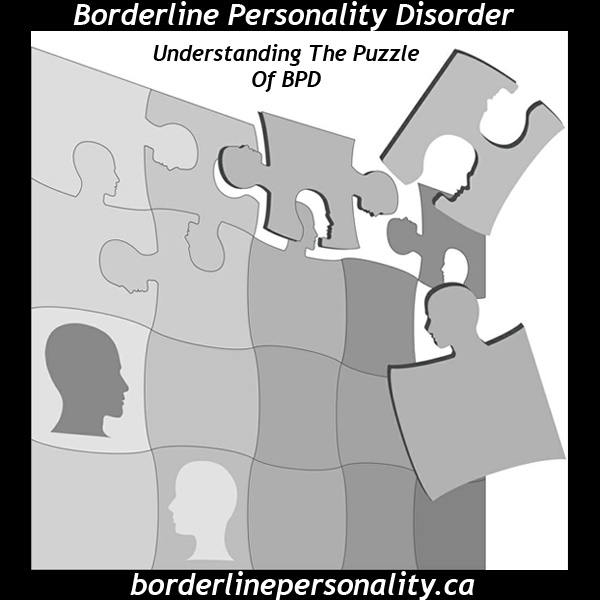The Controversy and The Reality about Recovery from Borderline Personality Disorder
There is controversy about recovery from Borderline Personality Disorder (BPD). This controversy stems from the complicated nature of BPD, the focus on the criteria for diagnosis, focus on medication and the notion that BPD is “all biological” and the neglect or failure on the part of professionals in terms of actually mapping out what the process of recovery from BPD is and what recovery from BPD can be defined as – how it can be measured.
As far as I know there has not, as of yet, anyway, been any professional who has actually come out and said here’s what you need to do to recover from BPD – or here is what recovery looks like. To date professionals seem content with the focus that is placed mainly in the following two areas:
- 1) The criteria for diagnosis
- 2) The medication needed or hoped for (future medications) to treat BPD according to symptom manifestation.
What’s wrong with this?
To begin with focusing only on the criteria for diagnosis defines the problem without offering the hope for its solution. The focus on medication now available or medication that many (not all) professionals like to claim will “someday” be the “cure-all” for BPD to treat symptoms as they present or manifest themselves does little, if anything, really, toward addressing what really needs to be addressed jointly by professionals and by those who have BPD in order for recovery to be possible.
One of the main controversial areas of Borderline Personality Disorder that fails to offer any hope for recovery is the continued focus (again by some – not all professionals) who continue to maintain (with insufficient evidence, in my opinion) that BPD is this ”all biological reality” that will take the discovery of some “wonder-drug” to fix or forever manage.
What Else Leaves Those With BPD Lacking Hope That Recovery Is Possible?
The on-going debates about what causes BPD, in many ways, are more harmful to those looking for help and to recover in the here and now. If the focus is placed upon causation or waiting to figure out what causes BPD in some irrefutable way the consequence of that is the continued suffering of those who have been diagnosed with BPD and who need effective treatment for it now. Treatment that doesn’t begin with the premise that one can’t get better. Treatment that isn’t a revolving door of punitive and unsupportive stigmatized judgment on the part of (again not all) many mental health professionals.
Are There Systemic Obstacles To Recovery?
YES!
Along with the reality for many with BPD that there are personal obstacles and the obstacles to recovery that are inherent in the very nature of what it means to have BPD, there are systemic obstacles as well.
I will go one controversial step further here and say that, from my own experience, there is perhaps a surprisingly high number (again certainly not all) mental health professionals who are on the front lines of the delivery of mental health services, who themselves have BPD. This throws a monkey-wrench of mammoth proportions into the mix. Those professionals who have BPD (whether they have been diagnosed or not) by the very nature of their own issues can spell disaster for the borderlines that might enter their offices seeking help and unbiased professional treatment.
There are many systemic reasons for the stigmatization of Borderline Personality Disorder. A stigmatization that marginalizes even the best efforts of those dedicated to getting well. There are many obstacles and challenges presented by these stereotyped stigmas that make it more difficult for many with BPD to find the kind of treatment that is required in order to get on and stay on the road to recovery.
Another systemic obstacle to recovery is the intractable and polarized idea on the part of (some not all) mental health professionals that BPD is intractable and that those diagnosed with can’t recover. This notion along with the increasing constraints on mental health care delivery systems due to funding issues means that those diagnosed with BPD are seen as taking up too much of the resources without the kind of return on those resources that studies deem acceptable.
This means that programs that can be very highly effective for many with BPD rather than increasing to meet the demand of an increasing population of those diagnosed with BPD are actually decreasing. These programs are casualties of a lack of funding. When mental health care programs are casualties of decreasing funding, borderlines become casualties of decreasing odds as to the possibility of recovery in many cases.
The Polarized Intractable Belief That Borderlines Can’t Recover
Some borderlines themselves in their own polarized and exceedingly negative experience and negative outlook based upon what it is that they continue to feel (which is often what is actually thought about in what are cognitively distorted thoughts) get to such a place of helplessness interwoven with hopelessness that they do not believe that they can ever get better, let alone recover.
It is important for those with BPD, new to the diagnosis, new to facing the reality and scope of the diagnosis, even if diagnosed years ago, or who are stuck still for whatever reason or reasons, to open up the possibility of change, growth, and getting better. One must believe in this possibility in order to find his or her way to the actualizing of it.
If a professional, a therapist, believes that borderlines can’t recover, frankly, I don’t know what they are doing in the profession that they are in. The possibility and potential for recovery must begin with the belief in its possibility. Without that – it isn’t possible. This believe or at the very least the potential to consider the possibility of recovery must be held and shared by both the therapist and the borderline if there is to be any chance for recovery.
The “Biology” of BPD – such as it is according to some – Need Not Be An Obstacle to Recovery From BPD
Yes, you read that correctly. Even if we were to say that there is some aspect of “biology” inherent in Borderline Personality Disorder it need not be an obstacle to recovery. I say this because I know from my own personal experience that the degree to which biology is the cause of BPD is really, in the big picture, such a red herring when it comes to getting better and to actually recovering from BPD. What do I mean by this? Well, no one has absolutely proven that BPD is a biological “brain” or “hard-wiring” reality at all. This, in my opinion, is highly unlikely. I don’t think that will ever be proven. Remember, I am only a person who has recovered from BPD. I am not a Ph.D. or a biologist or neurologist at all. However, along with my own personal experience I have the opinions that I do in this area because I recovered without my biology being changed. I recovered without my brain being “re-wired”. I recovered without the “miracle pill” some psychiatrists continue to herald the arrival of some day. Others have recovered too.
The irrefutable reality of the developmental argument as to the cause of BPD (I say this as someone who experienced it from the inside out) and the more substantial and measurable evidence for the effects of nurture – or lack thereof – over nature is abundant.
I have seen brain scans for example of patients with BPD that some professionals have included in their books when they try to put forth the “biology” causation argument. The conclusions they draw are not conclusive number one, cannot be proven, number two, and number three, even for the differences denoted in the brains of some with BPD there can be nurture or environmental explanations for. For example, most professionals agree that trauma can and does affect the hard-wiring of the brain. So show me a brain scan or CAT scan that has biological difference, okay, fine, now please prove to me how, when, and why those differences occurred. You see, that can’t be done.
The other thing that leaves me so frustrated by the futility of this biological causation argument is the fact that psychotherapy can and does impact those with BPD on a neurobiological level. Changing thoughts can change the way neurons fire and that type of thing. I will put some references (of what I’ve read to this effect up here in the near future). So even if there are some biological issues or causative factors interwoven with the reality of the developmental theory as to the cause of BPD they are not issues that cannot be dealt with.
I can’t help but wonder, truly, if the “BPD has to be biological” theory is a “professional out” if you will that gives some license to justify the lack of treatment available in many areas for those with BPD – this well they can’t get better anyway so why spend all that money kind of mentality – which is really systemic abuse and in the case of most diagnosed with BPD it is re-abuse and adds trauma to those who have already been traumatized in childhood.
Pushing back against the “BPD is biological” theory that requires some “wonder pill” that they haven’t yet invented (because there never will be such a thing) is the reality that psychotherapy can and does impact those with BPD on a neurobiological level. Changing thoughts can change the way neurons fire and that type of thing. I will put some references (of what I’ve read to this effect up here in the near future). This is what I know from the inside out. I know that aspects of BPD that I totally had changed when I learned how to think in more paradoxical averagely healthy ways and when what followed was not only a change in my thought patterns that eliminated “borderline distorted thought patterns” but there were no doubt changes that reached to the depth of my neuronal activity.
What You Most Need To Know Today If you Have BPD
What you most need to know today if you have BPD is that I have recovered and others have recovered and many are well down the path to recovery and are recovering. What does this mean for you? It means that you have every reason to hope. It means that you can truly believe that recovery is possible. It means that you will benefit from not allowing any mental health professional to treat you as if you cannot ever get better. If you are being treated that way, you may well want to find another therapist.
I was not ever on any “psychiatric medications” which is proof to me that they certainly aren’t what is needed to recover from BPD. Now that is not to say that for some with BPD there aren’t reasons to be on certain medications to help with certain symptoms as you work toward recovery and please don’t ever make any medication changes without consulting a professional. But also, know that there is no such thing as a “wonder-drug” or a drug cure and there won’t, in my opinion, ever be.
If you have Borderline Personality Disorder the very first thing you will need in order to have even a chance to find recovery is the belief that recovery is possible. You must dig down deeply inside of yourself to find the faith that can yield the hope necessary to believe in recovery. It is that belief in the possibility of recovery along with that faith that you will need, at times, to sustain you through the process of the work that recovery entails.
If you have Borderline Personality Disorder you also need to know that recovery is a choice. Yes, that’s right, a choice. You need to exercise that choice in your life in order to unearth the potential for recovery that lies within you.
Borderlines also need to know that recovery requires getting honest, being real, and taking personal responsibility. No one can drag you through this process or do it for you. No else is responsible for your recovery other than you. Just as no one else is responsible if you are not in recovery or not getting better, other than you. It is up to you. No one else, not even the most skilled therapist can “fix” you. But, you, you can empower yourself to commit to the journey of recovery from Borderline Personality Disorder by exercising the choice to take personal responsibility for undertaking the journey and sticking with it even in its roughest, most distressing and most painful moments.
Recovery from Borderline Personality Disorder is possible. Believe that! Start there. And if you've made some progress and then gotten "stuck" start there again. The process of recovery from BPD may well involve starting over many times.
And … don’t let anyone tell you that it is impossible. Don’t let anyone take away your belief in and faith in the possibility for your recovery. Excercising an active choice to pursue recovery is what will make it possible for you to recover.
© A.J. Mahari - January 9, 2008







